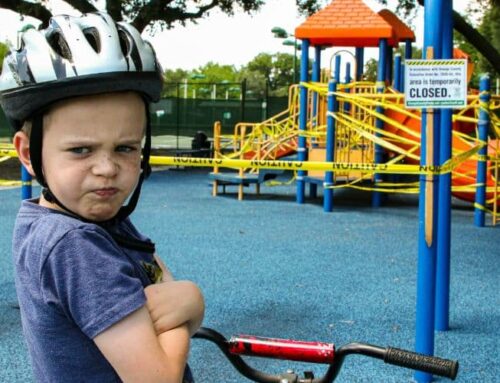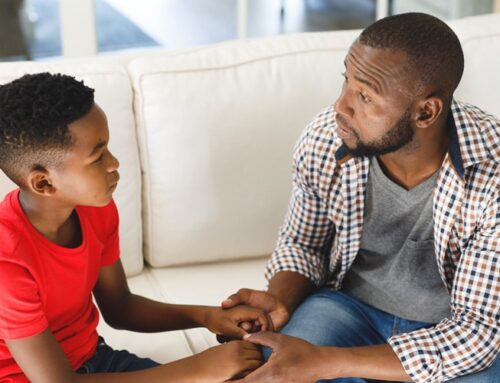If you’re a parent who wants to take communication with your children to a new level, that’s great. Admittedly, it might feel like an uphill climb, but identifying some conversation starters for your kids can get the ball rolling.
When my kids were teenagers, I was always amazed at how they could chatter non-stop with their friends—and then fall completely silent when I tried to start up a conversation with them. Of course, I knew that a big part of that was developmental, but I also understood the importance of finding conversation starters that would allow them to share their feelings and would let me engage in their world.
12 Conversation Starters Dads Can Use
Before you pass “Go” . . .
If you’re familiar with the board game Monopoly, you know that you get $200 every time you pass the “Go” space. And since Monopoly is based on financial security, free money is always a big deal!
Well, identifying the conversation starters that work best with your kids is the “Go” of this game. It’s the big payoff. Before you get there, though, you need to keep a couple of things in mind. First, understand that you have to be age-appropriate. Like so many things in parenting, effective conversation starters for your kids are based on where they are in life. What works with a school-age kid likely will fall flat when talking with a teen—and vice versa. So, know your kids and adapt as necessary.
Second, pick your spots. Sometimes, you can approach discussions with a structured approach. But not every occasion lends itself to conversations, and even the best conversation starters won’t change that. Effective talks with your kids take place when they are ready to be engaged. So, don’t force it. Be prepared at any moment and make the most of the opportunities you get!
Talk About It
Again, it’s important that you know your children so you can identify a topic that will get them talking—first generally and then at a deeper level.
I’m offering a dozen possible subjects that might get your children talking. As you get more practice at talking with them, you’ll learn more about what scratches their itches. You’ll also be able to use these topics as springboards for follow-up conversations in the future.
1. Their Fears
More than anything else, your child wants to feel secure. Conversation starters for your kids that focus on their fears and anxieties help create a sense of stability and safety. You can explore why the fears may be ungrounded, but you also can just listen as they process their feelings on their own. Either way, you’re being there, and that makes a huge difference.
2. Their Wins and Losses
In our student ministry at church, we spend time each week sharing “highs” and “lows.” We give kids time to talk about what’s gone right and what they wish had gone better. You can do the same with conversation starters for your kids, regardless of their age. Ask them about the best things that have happened to them recently and why those things were so great. And talk about the disappointments and how things might be different next time around.
3. Their Friends
Every parent is concerned with the company their kids keep. After all, the apostle Paul once wrote that “bad company corrupts good morals” (1 Corinthians 15:33). You can learn a lot about your children by letting them share about their friends. Ask them what makes a person a good friend and what they do when they experience a conflict with a friend. Tell them about some of your best friends through the years and what made those relationships so special—but keep the focus primarily on them.
4. Their Future
This is one of those conversation starters for your kids where you’ll have to be age appropriate. You can ask an older child or teenager about long-range plans, but most younger children won’t see beyond tomorrow or next week. Regardless, find out what excites them about the future and, if possible, where they see themselves in five or ten years. For older kids and teens, dig into topics like college, their dream jobs, and maybe even what they might look for in a future spouse.
5. Their Goals
While conversations about the future tend to be “long range,” questions about their goals emphasize the shorter term. These are things your child would like to accomplish sooner rather than later. You might even be able to help them set goals in a variety of areas: physical, spiritual, intellectual, financial, or social. Talk with them about their strategies for turning those ideas into reality.
6. Their Heroes
One great conversation starter for kids is to ask who they would like to meet—living or dead—and why. Learning about the people your kids respect and admire can tell you a lot about what they consider important. You also can discuss the people who are making a personal impact on their lives now, like a teacher at school or someone at church. Find out what makes those mentors so influential and what your child is learning from them.
7. Their Media Choices
The rise of technology and media options continues to exert tremendous influence on our lives—and the lives of our kids. So, conversation starters related to media choices are vital. You can start with things like their favorite shows or music. Encourage them to consider the positives and negatives of the messages they receive from those outlets. And spend time talking about the good and bad of social media. Let them tell you about things that have bothered them about the way people treat each other digitally and how they choose what to say and what to avoid.
8. Their Theology
I realize that a lot of dads aren’t comfortable talking with their kids about God or other religious subjects. You’d rather leave that to the church staff or someone with the “right training.” But conversation starters for your kids about theological issues don’t have to be deep or complicated. It could be as simple as asking what your child thinks about God, what it looks like to live for Jesus each day, how they know the difference between right and wrong, or something they’ve learned from the Bible recently. You also can share your own faith experience with them—just don’t turn it into a sermon. Keep it conversational.
9. Current Events
Regardless of their age, your kids probably have opinions. While they might not understand all the details about things that are going on around the culture or on the news, they likely take in more than you expect. I can remember talking with my parents about political leaders or cultural trends when I was younger. Looking back, I can see that they were curious about how much I knew about the names and places I mentioned, but I also believe they were interested in why those things interested me.
10. Family History
You can use simple questions such as, “What has been your favorite family vacation?” or “What’s the funniest thing that’s ever happened to us as a family?” You also can dig into things they would like to relive and things they would rather avoid in the future. You can even share about some of what you remember as a kid. These conversation starters for your kids not only enhance communication between you and your children, but they also engrain an appreciation for the bigger picture. They reinforce the legacy your family has created and increase the chances that it will extend to future generations.
11. Their Books
Not long ago, I was having lunch with a group of young adult guys I’ve been doing life with for several years. The conversation unexpectedly shifted toward books they had been reading, and I was amazed (pleasantly) at the direction this conversation took. Talk with your kids about the books they’ve been reading. It might be for school, or it could be for fun. Whatever the case, find out what made those books interesting—or not. Maybe you could even identify a book that you could read together and discuss. Books stimulate the mind, but they also provide fodder for incredible conversations!
12. Their Church
As noted earlier, kids (even younger kids) soak in a lot more than we think. And what they’re picking up at church can be a great conversation starter. Ask them what they have learned from recent Sunday school lessons or sermons. If they’ve been to a camp or retreat, encourage them to talk about the things that stuck out to them. These may dovetail into the theology discussions mentioned above, but they also can stand on their own legs. Resist the urge to talk more than you listen—and be open to things that God might want to teach you with these conversation starters for your kids.
Moving forward
As you think through some great conversation starters for your kids, keep in mind that this is not a one-and-done proposition; but a need for long-term connection. The point of starting these conversations is to enhance your conversations down the road. You want your talks with your children to become more frequent and to grow deeper and more honest over time.
You can make that happen by following two simple tips. First, wait for the answers. This has been mentioned a few times already, but it’s worth repeating. While the questions are important, the answers are the key to conversations. So, give your kids a chance to talk.
Second, don’t be afraid of follow-up questions. You don’t want to bombard your kids like a police interrogation on television cop shows, but you should be able to use initial questions as a launching pad for deeper questions. You’ll get better at this with more practice. In the meantime, let your kids set the pace as you follow their lead.
Using great conversation starters for your kids is just the beginning. The conversations they spark can last a lifetime!












